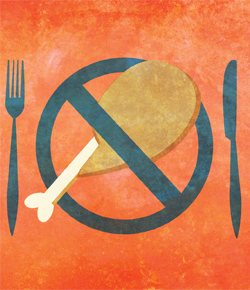Tzom Gedaliah Fast Day
What, why and how we mourn on the day after Rosh Hashanah
Tzom Gedaliah is a dawn-to-dusk fast observed on the day after Rosh Hashanah (if that day is Shabbat, it is observed on Sunday). Commemorating the tragic death of Gedaliah, governor of Judea, the day begins with special Selichot liturgy.
Historical Background
After the Babylonians destroyed the Holy Temple in Jerusalem and exiled many Jews in 3338 (423 BCE), they appointed Gedaliah ben Achikam as governor of the remaining Jews in the Holy Land. Jews who had taken refuge in the surrounding lands of Ammon, Moab and Edom heard of his appointment and returned to Judea to join his group—the last remnant of the once-mighty Judea. Under his wise and pious leadership, they tilled, planted and cultivated, coaxing the ravaged land back to health.
Prior to Rosh Hashanah 3339, Gedaliah received word that a certain Ishmael benNetaniah, jealous of his position of power and dissatisfied with his tactical alliance with the Babylonians, was planning to kill him and usurp the leadership for himself. But the trusting Gedaliah refused to believe that Ishmael would act treacherously, and restrained those who wanted to kill Ishmael.
On Rosh Hashanah, Ishmael came to Gedaliah with ten men, ostensibly to celebrate the holiday with him. While they were eating together, Ishmael and his men got up and killed Gedaliah, as well as all the other Jewish men and Babylonian soldiers who were present.
This treachery was followed by more bloodshed. It also caused the Jews to flee to Egypt, effectively ending the prospects of Jewish settlement in the Holy Land until the return of the Babylonian exiles in the year 3390 (371 BCE). (1) Thus, the Babylonian exile was absolute, and Judea was left bereft of her children.
The Fast
In memory of Gedaliah’s tragic death and its disastrous aftermath, we fast every year on the 3rd of Tishrei, the day after Rosh Hashanah. (2) If the 3rd of Tishrei falls out on Shabbat, the fast is postponed to the 4th of Tishrei. Like other “minor” fasts, it begins at dawn (alot hashachar) and ends at nightfall.
During morning services, it is customary to add special selichot, penitential prayers.
During both morning and afternoon prayers, the Torah is taken out, and we read the portion from Exodus 32:11–14 and 34:1–10 in which G?d forgives Israel for the sin of the golden calf. During the afternoon prayers, we also read a haftorah, from Isaiah 55:6–56:8.
As it is written in Zechariah 8:19, Tzom Gedaliah is one of the four fasts that will be converted to joy and feasting with the arrival of Moshiach. May it happen soon.






